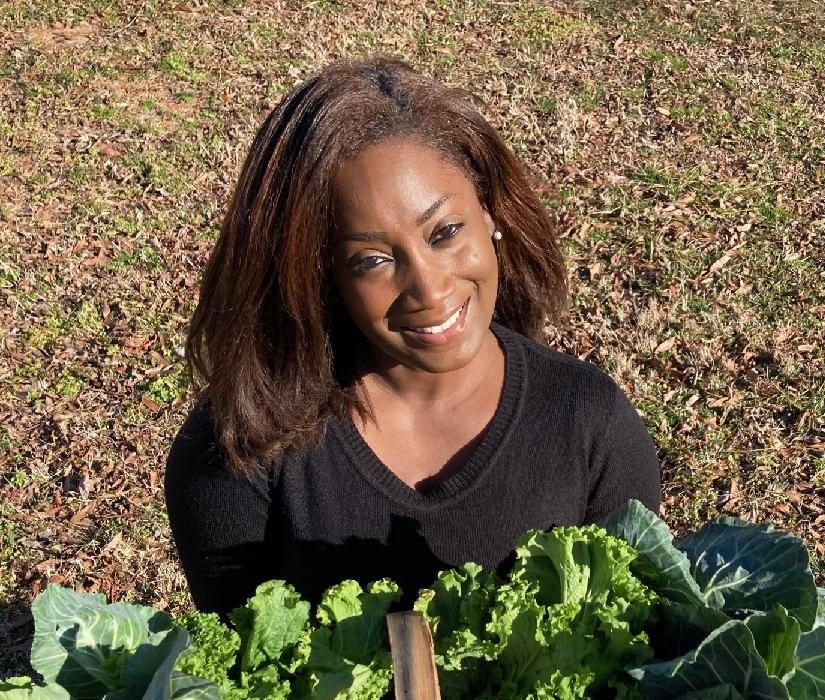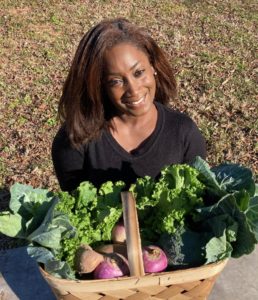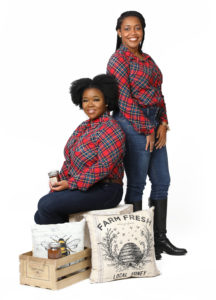Black. Female. Farmer.
Those three words aren’t something you see together very often. Nationwide, women make up approximately 36 percent of farmers. Although there isn’t data readily available, the percentage of black female farmers is less than one percent.
While that number is low, a noticeable shift has begun taking place. Across the country, black women are tapping into their natural being as providers and entering a space that has long been dominated by white men.
Get ready.
A change is coming.
Part-time farm life
If you travel on Interstate 85 North to Virginia, shortly before you cross the state border, you’ll pass a highway sign informing you of an upcoming exit for the town of Norlina. Situated in rural Warren County, this small community of less than 1,200 residents consists of dirt roads, open fields, and one grocery store. In an area that is considered a food desert, a native daughter is on a mission to alter the narrative.
LaTonya Andrews was born and raised in Raleigh. However, the essence of her being is rooted in the county where her parents were reared. Throughout her childhood, Andrews spent her summers, school breaks, and weekends on the farm her great-grandmother, Suzie Valentine Andrews, and her grandfather, Melvin “Boo” Andrews, owned and operated.
“My grandfather was the quintessential farmer,” recalled Andrews, 42. “Often time we would go out into the field and pick cucumbers for money. He’d load us up in the truck and give us a couple of quarters. It was good times, good memories.”
As adolescence gave way to adulthood, the recollections of her days spent roaming her family’s land were never far from her mind.
Full-time farm life
Approximately two hours and 40 minutes south of Norlina sits the town of Elizabethtown. With a population almost triple the size of Norlina, it’s the county seat of Bladen County. It’s also the hometown of sisters Michelle, 32, and 28-year-old Brielle Wright.
Like Andrews, their younger years were spent trudging around in dirt, planting seeds, and harvesting crops.
“We grew up on a farm,” Michelle recounted. “Our grandfather was still farming when we were young. We participated in different things – shucking corn, shelling peas, creaming corn.”
Yet, their biggest influence came in the form of their 103-year-old great-grandmother, Mae Ola Sheridan, aka Granny, who was “more direct and intentional” with her approach. She would take the siblings out to her garden to teach them how to plant seeds and feed chickens.
Fast forward over 20 years and it’s evident the seeds in the ground aren’t the only ones that were planted during their younger years.
Tapping into the soul
In 2017, Andrews had a full-circle moment as her childhood and adult aspirations collided head-on. Citing “a pull towards this land,” she purchased the farm where she grew up from her father – 60 acres in total. Although she apprehensively wondered if she was ready for this monumental challenge, one thing Andrews knew was that she had to keep the land within the family.
“There are many unfortunate situations where families have to sell their land to outsiders then it’s developed and turned into something they have no control over,” noted Andrews. “I didn’t want to see that happen because I was witness to how much hard work, time, effort, sweat, and tears my grandfather, grandmother, and great-grandmother put into that property. There was no way I could see that go to a stranger.”
With the sale complete, Andrews became the owner of the land synonymous with her family. She also had the perfect name as it is analogous with Norlina: Soul City Farm.
An ode to the former planned community in Warren County that was proposed and developed by former civil rights leader, the late Floyd McKissick, Andrews sees the land through the lens of connecting the past, the present, the future.
Derailed by systemic oppression, racism, and lack of funding, Soul City never reached its full potential. A few houses and the pool remain. The health center is overgrown. And a portion of the land now contains a prison. Despite its current state, the Air Force veteran believes she has a chance to breathe new life into an area that is in need of access to food as well as inspiration.
“The name for me symbolizes opportunity, growth, and from what I recall at that time, an unbelievable sense of community pride in that community,” stated Andrews. “In Norlina, people are helpful. Everybody always knows somebody.”
Before Andrews could start the process of preparing the farm for planting, first on her list was absorbing the intricate details of land management. Since the land hadn’t operated as a working farm in many years, it was essential she learned how to maintain it so it could thrive at its optimal level. Andrews’ first crops, planted in 2018, consisted of cabbage, squash, tomatoes, broccoli, and collard greens.
Crediting the United States Department of Agriculture (USDA) and the North Carolina Cooperative Extension with sharing invaluable information she’s learned, Andrews admits she is “still learning” the ins and outs of farm life.
Staying at home has its purpose
Nearby in Elizabethtown, the Wright sisters are entrenched in education as well. Having always known that at some point in their lives their service to their community would include agriculture, black identity, and entrepreneurship, they weren’t sure how that would manifest itself until last April.
“We started a farm,” said Brielle, excitedly. “In a pandemic.”
For the siblings, the timing was perfect. Brielle, who is a graduate of North Carolina A&T State University and works for the USDA, traveled extensively with her job. With travel discouraged and the remote work model implemented, at this time, she had the luxury to focus on life at home. And that’s how the Farmer’s B.A.G. (Black, Abundant, and Gifted) was born.
Initially, they started selling strawberries. As word of mouth about their business venture spread throughout the town, they expanded their operations to include jams, jellies, syrups, pickled watermelon rinds, and pickled peppers. They also incorporated seasonal products into their inventory.
Adding to the similarities in their story as it relates to Andrews’ is the fact their farm also operates on land once owned by their great-grandmother. With both sides of their family having agricultural backgrounds, growing food is about much more than simply providing items for people to eat.
“We grew up in a household where our mom put a lot of emphasis on love and care for people,” Michelle explained. “A lot of the opportunities we have with our business and with our farm are about how do we invest in people – supporting them in entrepreneurship and encouraging other people in agriculture. It’s a really big deal to be that representation.”
Their continued quest to serve as representatives extends beyond the farmland. Michelle, who works for a rural health department, graduated from Winston-Salem State University with a degree in Psychology. Her coursework included classes in Community Psychology and Community Health, which opened her eyes to food disparities and how they can affect overall health.
“I’ve learned about the impact of food on your mental and your cognitive behavior,” Michelle noted. “In areas where there are higher numbers of people of color, food was more likely to be bruised, didn’t have the same luster, and there wasn’t a lot of variety. You find these limited options and people say you’re not in a food desert. Technically, they can access certain things but you’re not giving me the opportunity to access good quality foods or a variety. You’re not allowing me to expand my palate. You’re not allowing me to have the access to the things that could benefit me mentally and physically. From a public health perspective, you look at how all these things come into play.”
While Michelle is tackling assisting the public in a more front-facing role, Brielle is taking on the lack of diversity and expansion from the inside. Both are pursuing these issues together within their business.
“When people think of black people and farming, they think of it from a hardship standpoint,” said Brielle. “We want to change that narrative. There’s not a lot of us on the corporate side advocating for change or an increase of underrepresented groups in these corporate spaces who are deciding what agriculture and food security look like for us. All that pours into what we’re doing with the Farmer’s B.A.G.”
Expanding the network while prioritizing community
As a growing extension of the legacy established by their ancestors decades ago, both Andrews and the Wright sisters are committed to increasing their operations to benefit their neighbors and beyond. As a result of the pandemic, the spotlight on food and, in many cases, the lack thereof, has found its way to the forefront providing these women with a chance to increase their footprint.
“It’s a great opportunity for farming and food access,” assured Andrews, who additionally works as a research assistant in the healthcare industry. “With people losing their jobs and going through so many challenges, they need food now more than ever. My goal for the upcoming season is to create avenues to get fresh food and nutritious produce to the people within the county who are in need. I would like for the farm to be a space of great benefit to Warren County and the neighboring counties. Being able to bridge that gap would be quite important for our farm.”
Another avenue Andrews is using to address this problem is her collaboration with the Black Famer’s Hub in Raleigh. The hub serves as a space for black farmers to get their products into various markets. It’s also led her to seek Community Supported Agriculture partnerships throughout the locality.
In the Bladen County area, established farming networks are essentially nonexistent. Michelle and Brielle hope to change this fact. The Farmer’s B.A.G. is in the process of gathering interest in starting a Black, Indigenous, People of Color Beekeeper’s Association in the area. They’re dreaming big for the future as well.
“Our goals are centered around us positively impacting our community and taking the knowledge we have to support people in being able to be their best selves,” said Michelle. “We want it all. Our long-term vision is everything. We want to see our farm as an institute thrive with our sales and what we’re able to produce. We want to expand to different products. I’m passionate about using natural ingredients, ones that aren’t toxic and good for the environment but also good for your body and natural processes. We want to do education, youth outreach, advocacy, create a network or collective. We want to build a community. A literal community.”
Ironically, Brielle chimes in and adds excitedly, “Like Soul City!”
Soul City?!
“Yes, we will create a whole city for black and brown people to thrive and we’re not going to need the government’s funding to be able to do it,” Brielle states firmly. “We’re going to surpass that.”
As this trio of ladies continues to be an example for other black women who seek to travel a similar path, Andrews offers her advice.
“Write down your goals,” Andrews implores. “Stick with it and have pride in it. Find other people who are doing similar things as you. It’s amazing how you find support in the most unlikely places. There are networks of black women farmers – old and young. Don’t become discouraged even though there will be some hard days. Farming is blood, sweat, and tears. They’ll be all on that land but there is a sense of pride when you see that first sprout of growth coming out of the ground.”
To learn more about Soul City Farm, contact Andrews via soulcityfarm@gmail.com.
To learn more about Farmer’s B.A.G., visit its Facebook page at https://www.facebook.com/thefarmersbag/ or Instagram page at https://www.instagram.com/thefarmersb.a.g/.
 Kassaundra Shanette Lockhart is a freelance writer.
Kassaundra Shanette Lockhart is a freelance writer.



HI, I’m interested in learning farming can i come visit your farm learn more about what you are doing